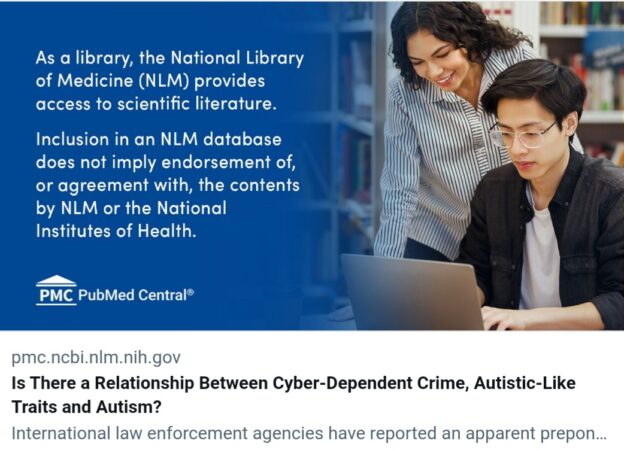This article reviews a study exploring links between autistic-like traits, autism, and cyber-dependent crimes. Findings show autistic-like traits increase cyber-crime risk, while autism reduces it. Advanced digital skills are a key factor. The study highlights opportunities for autistic individuals in cybersecurity but is limited by self-reported data and sample representation. Further research is needed to clarify causal links and broader impacts.
The study, “Is There a Relationship Between Cyber-Dependent Crime, Autistic-Like Traits and Autism?“, conducted by Katy-Louise Payne and colleagues, explores whether autistic-like traits and autism are associated with cyber-dependent crimes. The research stems from anecdotal evidence by international law enforcement agencies suggesting a prevalence of autism among cybercrime offenders. However, no prior empirical evidence supported such claims.
This research sought to clarify this connection by studying 290 participants (23 of whom self-reported autism). It examined relationships between autistic-like traits, autism diagnosis, explicit social cognition, interpersonal support, and digital skills, using an anonymous survey.
Key Findings
- Increased Autistic-Like Traits Linked to Cyber-Crime Risk:
- Higher levels of autistic-like traits correlated with a greater likelihood of engaging in cyber-dependent crimes.
- However, an autism diagnosis correlated with reduced cyber-crime involvement.
- Digital Skills as a Mediator:
- Advanced digital skills explained ~40% of the link between autistic-like traits and cyber-crime.
- Basic digital skills accounted for ~23% of the association.
- Protective Role of Autism:
- Despite higher autistic-like traits among those with autism, they were less likely to engage in cyber-crime compared to non-autistic individuals with similar traits.
- Other Factors:
- Explicit social cognition and interpersonal support did not significantly influence cyber-dependent crime.
- Cyber-dependent offenders were more likely to be males with advanced digital skills but without autism diagnoses.
- Employment Implications:
- Advanced digital skills among individuals with autistic-like traits make them suitable candidates for cybersecurity roles, addressing the talent gap in the field.
Critique of the Study
Strengths:
- Pioneering Research: This is the first empirical study to explore the association between autism and cyber-dependent crimes.
- Holistic Analysis: It combines assessments of autistic traits, digital skills, and social cognition.
- Practical Insights: The findings highlight potential employment pathways for individuals with advanced digital skills and autistic-like traits.
Limitations
- Self-Reported Data:
- Autism diagnoses were not independently verified, risking potential misclassification.
- Reliance on participant honesty regarding criminal behavior may introduce bias.
- Sample Representation:
- The study sample is skewed towards digitally skilled individuals, limiting generalizability.
- Cross-Sectional Nature:
- The study cannot establish causal relationships, such as whether autistic traits lead to advanced digital skills or cyber-crime.
- Small Subsample of Autistic Participants:
- Only 23 participants reported an autism diagnosis, making statistical conclusions about this subgroup tentative.
- Unaccounted Variables:
- Implicit social cognition, a potential factor, was not measured. Additionally, motivations behind cyber-crime (e.g., financial gain vs. reputation) were not explored.
Opportunities for Future Research:
- Longitudinal Studies: To establish causal links between autistic traits, digital skills, and cyber-crime.
- Diverse Populations: Expanding to different demographics and geographies for broader applicability.
- Focus on Cyber-Crime Motivations: Understanding how intrinsic motivations (e.g., challenge-seeking) influence cyber-dependent crime.
- Inclusion of Implicit Cognition: Exploring the role of implicit social cognition in crime deterrence.
Conclusion
The study challenges the assumption of a direct relationship between autism and cyber-dependent crime, suggesting instead that advanced digital skills among individuals with high autistic-like traits are the driving factor. These insights advocate for better support systems for autistic individuals and leveraging their strengths in cybersecurity industries. Further research is needed to substantiate these findings and explore their implications in criminal justice and workforce development.
